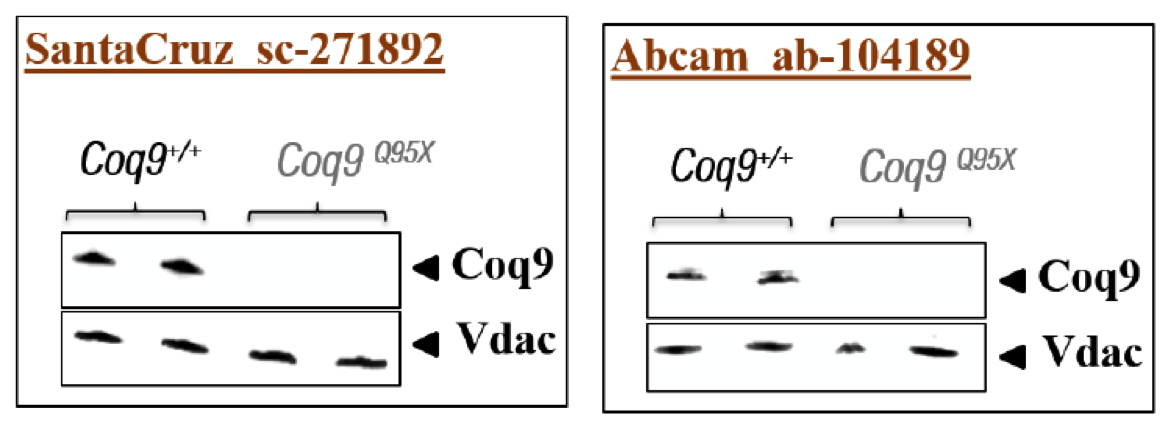This is a knockout-validated antibody summary, based on the publication "The clinical heterogeneity of coenzyme Q10 deficiency results from genotypic differences in the Coq9 gene", as cited below [1]. Labome curates formal publications to compile a list of antibodies with unambiguous specificity within Validated Antibody Database (VAD).
COQ9, coenzyme Q9
sc-271892 (Santa Cruz)
ab104189 (Abcam)
Santa Cruz: COQ9 Antibody (E-3) is a mouse monoclonal IgG2b raised against amino acids 165-318 mapping at the C-terminus of COQ9 of human origin, recommended for detection of COQ9 of human origin by WB, IP, IF and ELISA.

Abcam: Rabbit polyclonal raised against synthetic peptide (conjugated to KLH) corresponding to a region within internal sequence amino acids 160-190 of human COQ9. Reacts with mouse and human protein and has been used in western blot.
Santa Cruz Biotechnology and Abcam
Western blot
Kidney homogenate from Coq9Q95X mice. Samples were homogenized in buffer A (50 mM Tris–HCl, 1% Triton X-100, 1 mM dithiothreitol, pH 7.6, protease inhibitor cocktail) at 1,100 rpm in a glass–teflon homogenizer. Homogenates were sonicated and centrifuged at 1,000 g for 5 min at 4°C, and the resultant supernatant was used for Western blot analysis. 60 μg of proteins from the sample extracts was electrophoresed in 12% Mini-PROTEAN TGX™ precast gels (Bio-Rad) using the electrophoresis system mini-PROTEAN Tetra Cell (Bio-Rad). To detect the truncated version of the COQ9 protein in Coq9R239X mice. In all experiments, proteins were transferred onto PVDF 0.45-μm membranes using a mini Trans-blot Cell (Bio-rad) or Trans-blot Cell (Bio-Rad) and probed with target antibodies
peroxidase-conjugated horse anti-mouse, anti-rabbit IgG antibodies.
Amersham ECL™ Prime Western Blotting Detection Reagent.
This is not a knockout; however, the mutated Coq9 gene has a premature termination mutation. High-resolution LC-MS/MS of kidney mitochondria showed that none of its peptides were observed in Coq9Q95X mice, thus Coq9 protein was completely absent in Coq9Q95X.
- If you are aware of any publication with knockout studies validating a monoclonal or recombinant antibody, either purchased from any supplier or developed by the author(s), please notify us through feedback.
- productgene
